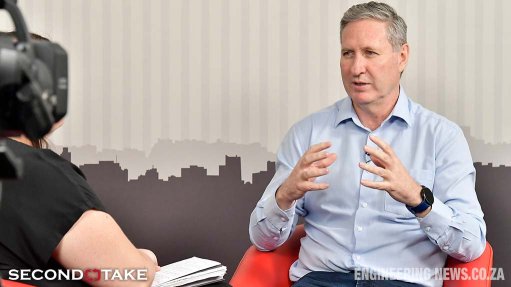Constant reinvention key for businesses to stay ahead of the curve in rapidly evolving digital era – Accenture
In the rapidly evolving digital era, companies not only need to undertake digital transformation, but it is becoming increasingly critical for them to become constant reinventors of every part of their businesses to keep ahead of the curve.
Constant reinvention needs to become a part of a company’s DNA, particularly as the rate of disruption, in just the last two years, has gone up three times, and the risk of falling behind by not transforming is high, says Accenture Africa communications, media and technology MD Nitesh Singh.
“Every business is a digital business. What we are now starting to see is that transformations are not finite and every organisation needs to think about a strong digital core that is underpinned by the changing lines of business.”
Digital transformation, which, prior to the Covid-19 pandemic, largely focused on customer experience, has evolved to be the centrepiece of operational efficiency and innovation across the organisation.
Leading companies in enterprise technology are growing two times faster than most companies and, by doubling down on their technology investments recently, they are now growing five times faster.
Changing market conditions, ageing technology, climate change and regulation, high energy prices, inflationary pressures, geopolitical tensions, supply chain disruptions, talent shortages and an economic downturn necessitate business reinvention.
A strong digital core, comprising elements such as platforms, cloud infrastructure, data, artificial intelligence and security, forms the foundation for any business in the digital era, providing a stable, future-forward base from which the business can operate and thrive.
“We are seeing a very low percentage of corporates that are doing this,” he says, pointing out that the “reinventors”, which account for just 8% of the 1 500 companies surveyed in Accenture’s latest ‘Total Enterprise Reinvention’ report, are actually starting to understand this model and taking it a step further.
The aim of “reinventors” is to reinvent every part of their companies, centred around a digital core and new ways of working that establish a culture and capability for continuous reinvention.
This approach leads to improved financials, the ability to achieve perpetual breakthrough innovation, increased resilience amid any disruption and an enhanced ability to create value for all stakeholders.
Discussing some of the outcomes from the report, Singh explains that these “reinventors” are starting to see the world a bit differently.
“What we are starting to see is a different type of company starting to emerge.”
The report found that 86% of the companies surveyed are so-called “transformers” focused on transforming parts of their business rather than the whole and treating transformation as a finite programme rather than a continuous process.
About 6% of companies are “optimisers” focused on functional transformation limited in scope and ambition, with technology not a significant enabler of their transformation.
The report also shows that 70% of digital transformations are failing to deliver business value.
While digital transformation is critical and the risks of not undertaking digital transformation in the era of the fourth industrial revolution are significant, a failed digital transformation has widespread disastrous outcomes for a company, Singh warns.
He explains that this can be caused by a number of factors, with the report showing that 64% of these projects are exceeding their budgets, 40% of the projects overrun, and 28% have slow decision-making.
Too much customisation, a lack of buy-in and a lack of senior alignment also contribute to digital transformation failures.
Further, when these transformations happen, it is often already too late, he says, noting that customers have started to churn, complaints have increased, share prices have declined and revenues, sales and earnings before interest, tax, depreciation and amortisation have contracted, triggering a need to transform and create a service strategy.
However, “knee-jerk, overhasty and poorly planned” reinventions in response to all the crises in the business environment can have dire consequences, including reputational damage, customer and staff churn, as well as cybersecurity breakdowns.
This, in turn, can further impact on competitiveness and leadership continuity.
“Creating 360º value in a business is about taking a holistic approach, rather than focusing on a few key activities,” Singh notes.
Reinvention, he says, should happen constantly across a number of business categories, including finance, sustainability, talent, diversity and inclusion, customer and staff experiences, besides others.
“Companies must consider their people, the environment, the industry they operate in, operational efficiencies and innovation, and market fit, profitability and sustainability.”
Companies need to really understand their customer market, have a deep understanding of those customers and have a very clear strategy of how they are going to service and sell to that base of customers.
“Accenture’s global research has found that companies that do well in the digital era always put their customer needs and experiences first. This means shaping the business strategies, products and services on what customers need and want, and working backwards from there to determine processes, resources and skills needed in the business to deliver on the customers’ evolving needs,” he explains.
“In a time when so many large and small businesses are struggling or failing, embracing the principles of holistic, constant reinvention are of huge business importance in the digital era,” says Singh.
Manageable, systematic and holistic reinvention approaches require proactivity, a common purpose, customer experience prioritisation, significant investment in talent and diligent upkeep of core technologies.
Comments
Press Office
Announcements
What's On
Subscribe to improve your user experience...
Option 1 (equivalent of R125 a month):
Receive a weekly copy of Creamer Media's Engineering News & Mining Weekly magazine
(print copy for those in South Africa and e-magazine for those outside of South Africa)
Receive daily email newsletters
Access to full search results
Access archive of magazine back copies
Access to Projects in Progress
Access to ONE Research Report of your choice in PDF format
Option 2 (equivalent of R375 a month):
All benefits from Option 1
PLUS
Access to Creamer Media's Research Channel Africa for ALL Research Reports, in PDF format, on various industrial and mining sectors
including Electricity; Water; Energy Transition; Hydrogen; Roads, Rail and Ports; Coal; Gold; Platinum; Battery Metals; etc.
Already a subscriber?
Forgotten your password?
Receive weekly copy of Creamer Media's Engineering News & Mining Weekly magazine (print copy for those in South Africa and e-magazine for those outside of South Africa)
➕
Recieve daily email newsletters
➕
Access to full search results
➕
Access archive of magazine back copies
➕
Access to Projects in Progress
➕
Access to ONE Research Report of your choice in PDF format
RESEARCH CHANNEL AFRICA
R4500 (equivalent of R375 a month)
SUBSCRIBEAll benefits from Option 1
➕
Access to Creamer Media's Research Channel Africa for ALL Research Reports on various industrial and mining sectors, in PDF format, including on:
Electricity
➕
Water
➕
Energy Transition
➕
Hydrogen
➕
Roads, Rail and Ports
➕
Coal
➕
Gold
➕
Platinum
➕
Battery Metals
➕
etc.
Receive all benefits from Option 1 or Option 2 delivered to numerous people at your company
➕
Multiple User names and Passwords for simultaneous log-ins
➕
Intranet integration access to all in your organisation

















